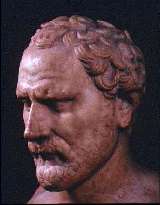
Born: 384 B.C., in Attica, Greece
Died: October 12, 322 B.C., in Calauria, Argolis
Demosthenes was an Athenian statesman, military leader and orator who attempted to rally the people of Athens to oppose the military advances of Phillip of Macedon, and later, Philip's son, Alexander the Great. His writings provide detailed insights into the life and culture of Athens in this time period.
Demosthenes was the son of a wealthy sword maker in Athens. His father died when Demosthenes was quite young and left the boy a large estate. Unfortunately, the boy's unscrupulous guardians defrauded him out of much of the money which inspired him to pursue retribution through the courts when he came of age.
His education was typical of an Athenian boy at that time with the exception of the substitution of oration and rhetoric in place of the customary physical training. However, he was somewhat hindered by a speech defect that caused him to stammer. He went to unusual efforts to overcome his speech problems but his first public speech was a disaster. Later, his speeches against his guardian, Aphobus, were only slightly more successful in that he won the trial, but was awarded no compensation.
Despite his difficulties in speaking, some Athenians recognized his abilities as a writer. During this period in time, persons involved in a trial were required to speak on their own behalf. However, it was common to hire a speech writer and it was in this niche that Demosthenes began his career.
His first significant speech was made at the age of thirty. He spoke to the Assembly and argued for the development of a military force capable of defending the city against attack from Persia and other aggressors. He proposed a system of taxation to fund the military that shifted the burden of taxation more heavily onto the rich. His speeches won him the position of the leader of an alliance known as the Democrats.
In 354 B.C., Demosthenes gave the speech On the Navy Boards, which dealt with enemy threats from the east. Three years later, he presented First Philippic, the first in a three-part series of verbal assaults on the advances and aggressions of Philip of Macedon.
Demosthenes continued to speak out against the expansionist actions of Philip of Macedon. In 349 B.C. he gave the speech The Olynthiacs, urging the people of Athens to go to the aid of another Greek city which was being attacked by the Macedons. His speech failed to rally support, however, and the city fell to the control of Macedon.
Demosthenes and Aeschines were sent to meet Philip to negotiate a treaty. However, Philip was suspicious of the Demosthenes' eloquent speech and saw him as a threat. He negotiated only with Aeschines who thought resistance to Philip was futile and believed peace any cost was required. The two men returned to Athens enemies.
In his third effort to convince the Athenians of the threat from Macedonia, The Third Philippic, Demosthenes finally won some support and was appointed admiral of the Athenian fleet. Unfortunately, their naval strength was not enough to defeat Philip's army.
When Philip was assassinated in 336 B.C., he was replaced by his son Alexander, later to be called Alexander the Great. Alexander was more aggressive than his father and destroyed the city of Thebes for rebelling. Athens was partially spared from Alexander's wrath when he chose to pursue conquests in Asia.
Aeschines and Demosthenes continued to battle in the public forum with Oration of Aeschines against Ctesiphon and with Demosthenes' defense On the Crown. Both works provide keen insights into this period in Greek history.
Demosthenes was eventually jailed on dubious charges and Aeschines had been exiled from Athens. Demosthenes eventually escaped into exile as well but was later recalled to the city when patrons agreed to pay his fines. However, the new leader of the Assembly did not endorse his repatriation and he was forced to flee the city again. To avoid capture, he committed suicide.
His writings are said to have influenced Roman orators such as Cicero and his speeches were studied during the Middle Ages for their eloquent style. In the nineteenth and twentieth centuries, his military mobilization tactics and political shrewdness were also studied.